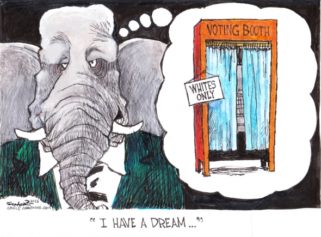You probably shouldn’t expect South Carolina Rep. Tim Scott to go out of his way advocating for African Americans when he joins the Senate next month as the first black Republican in that body since 1979.
No sooner than South Carolina Gov. Nikki Haley decided to select Scott to replace Jim DeMint in the Senate did Scott and those around him, including Gov. Haley, stress that Scott’s race has nothing to do with his selection and with who he is.
“What I’ve not ever really heard on the campaign trail was, besides the fact that you’re black, or because you’re black, here’s what we want to do,” Scott said Monday. “They’ve asked me questions about values and issues, and that’s an amazing thing.”
Gov. Haley, the daughter of Indian-American immigrants and South Carolina’s first female governor, said his race was not a factor in his selection, but rather his love for the state and ability to strongly advocate for it in Washington.
“I knew that he was the right person,” Haley said. “It is very important to me, as a minority female, that Congressman Scott earned this seat.”
But it shouldn’t come as a surprise that the ultra conservative Scott, a favorite of the Tea Party, doesn’t think race is relevant to him at all—though he will continue to get a great deal attention as the only black member of the Senate. When Scott was elected to the House two years ago, he decided against joining the Congressional Black Caucus. Another black Republican, Rep. Allen West from Florida, who just lost his reelection bid, did decide to join the CBC—although his membership in the group was rocky from the start.
Scott said at the time that he didn’t join because he has always lived in a world that was integrated.
Scott also weighed in on the issue of gun control after the Newtown, CT, massacre, saying that new legislation to restrict gun sales is not the answer.
“I think the solutions are not necessarily in new legislation,” Scott said on CNN’s “Starting Point with Soledad O’Brien.” “Perhaps the solution starts with us examining the mental condition of the person and the persons in the past that have had the desire to create the atrocities we have seen recently.”
Scott added that “mental illness should be a major part of the conversation.”
Scott said he wants to be an advocate for people who come from difficult, poverty-stricken backgrounds such as his—he grew up in a household led by a single mother who worked 16 hours a day to raise him and his brother.
“I am very thankful to the good Lord, and to a strong mom who believed that sometimes love has to come at the end of a switch. And she loved me a lot,” Scott said. “My mother did not quit on me.”
Scott told the Associated Press that conservatives needed to sell capitalism as a path from poverty and said he wanted to develop a plan for “people who come from neighborhoods like I came from and simply sell them on the fact that this country is a place where you can rise to any level.”
In the eyes of Charleston County Republican Party Chairwoman Lin Bennett, Scott’s race hasn’t had anything to do with his political success as a conservative Republican. She said Scott was a strong, pro-business advocate who believes in a smaller government that leaves more decisions up to individuals.
“Obviously he’s black, but I don’t think that discussion has ever come up in selecting Tim to represent us at any level,” Bennett said. “He knows what he believes in. People vote for him based on where he stands on the issues.”


